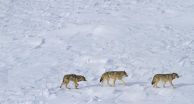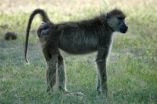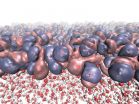(Press-News.org) HANOVER, N.H. - Although the media often portray the Arctic as a new "Great Game" ripe for conflict, a group of international Arctic experts co-chaired by Dartmouth College released recommendations today aimed at preserving the polar north as an area for political and military cooperation, sustainable development and scientific research.
The report, which addresses the priorities of the Arctic Council, an intergovernmental forum of the eight nations that border the polar region, resulted from meetings at the Carnegie Endowment for International Peace in Washington, D.C., in 2014 and 2015 under the auspices of the Institute for Arctic Policy (IAP), co-chaired by Dartmouth and the University of Alaska Fairbanks.
The report, titled "Arctic Council Initiatives to Sustain Arctic Cooperation," coincides with a change of leadership at the Council. Canada hands the two-year rotating chairmanship to the United States at a meeting in the Canadian territory of Nunavut on April 24. The Council's other member states are Denmark, Finland, Iceland, Norway, Russia and Sweden. It also includes six indigenous organizations with permanent status and nations and interested organizations holding observer status.
The report encourages United States leadership in issues related to climate change, environmental dangers, shipping, commercial fishing, energy development, maritime infrastructure and indigenous rights, all of which are dependent on continued political cooperation in the Arctic. The report stresses that improving current geo-political conditions, including tense relations between Russia and the West inside and outside the polar region, is essential.
"According to our report, cooperation can be maintained providing all Arctic countries continue to address Arctic issues on their own merits and manage competing national interests within a framework of international cooperation that has shielded this region since the end of the Cold War," says Virginia, report co-author and co-leader of the U.S. State Department's recently established Fulbright Arctic Initiative, which funds interdisciplinary work for scholars from Arctic Council nations. "The task of the United States will be to provide the leadership and political vision to keep the Arctic Council and the Arctic on a positive path. The United States must make clear that it is prepared to continue Arctic cooperation and welcomes constructive Russian activity in the region." Report co-author Kenneth Yalowitz, a Wilson Center global fellow and a former U.S. ambassador to Belarus and Georgia, adds: "Only time will tell, but the Arctic remains one of the few promising pathways despite the major downturn in Western relations with Russia."
Virginia is the Dartmouth co-director of IAP, an institute of the University of the Arctic that has convened meetings since 2008 of international experts to report on critical Arctic issues. Dartmouth and the University of Alaska Fairbanks have partnered with the Carnegie Endowment on meetings addressing Arctic security.
Experts who met at the Carnegie Endowment agreed that the Arctic Council and the U.N. Convention on the Law of the Sea (UNCLOS) continue to be the primary mechanisms to ensure cooperation, engagement and transparency in the Arctic. The U.S. chairmanship program has set priorities in the following areas: Arctic Ocean safety, security and stewardship; economic and living conditions; and the impacts of climate change. The report supports these goals and the need to address climate change challenges resulting from loss of sea ice, sea level rise and thawing permafrost. Equally important are limiting black carbon pollution and improving air quality, continuing research and programs to ensure ecosystem health as energy development increases and improving the safety of Arctic navigation.
Additional report recommendations include:
The United States should ratify UNCLOS to enhance U.S. authority on Arctic issues.
Develop improved communications, standardized procedures and multilateral training for search and rescue, military movements, natural disasters, maritime awareness, oil spill management, shipping infrastructure and oil, gas and mineral development.
The Arctic Council should lead in identifying priorities for scientific study.
Develop more small-scale and renewable energy projects to improve the economic future of small communities.
Improve individual and community health and food security.
Improve early warning systems for environmental change.
Adopt an international ban on commercial fishing in the offshore Arctic Ocean until an appropriate management plan is in place.
Increase indigenous people's participation in and benefits from Arctic policies.
INFORMATION:
Report authors are Ambassador (ret.) James Collins at the Carnegie Endowment, Michael Sfraga at the University of Alaska Fairbanks, Ross Virginia at Dartmouth and Ambassador (ret.) Kenneth Yalowitz at the Wilson Center.
Broadcast studio: Dartmouth has TV and radio studios available for interviews. For more information, visit: http://www.dartmouth.edu/~opa/radio-tv-studios/
The report is available from the Institute of Arctic Studies at http://dickey.dartmouth.edu/environment and from the Arctic Virtual Forum at http://arcticforum.org. A PDF also is available on request.
Dartmouth Professor Ross Virginia, director of the Institute of Arctic Studies within the John Sloan Dickey Center for International Understanding at Dartmouth, is available to comment at Ross.A.Virginia@dartmouth.edu.
Only three wolves seem to remain in Isle Royale National Park. Researchers from Michigan Technological University observed the wolves during their annual Winter Study, and the lone group, at an unprecedented low, is a sharp decline from nine wolves observed last winter.
The study's report, released today, marks the project's 57th year of observing wolves and moose in Isle Royale. It is the longest running predator-prey study in the world. This year, along with the three resident wolves, scientists estimated 1,250 moose on the island and observed two visiting wolves, ...
Massachusetts General Hospital (MGH) investigators have found the probable mechanism underlying a previously described biomarker associated with the risk of developing serious diseases ranging from cancer to cardiovascular disease and the risk of serious complications. In a paper published in the American Journal of Hematology, the research team reports finding that higher levels of a measure routinely taken as part of the complete blood count - the extent of variation in the size of red blood cells - is caused by reduced clearance of aging cells from the bloodstream. Hundreds ...
When you take a medication for, say, high cholesterol, do you know that pill is really what the label says it is? Depending upon the type of medicine and where you live, the threat of falsified medications (also referred to as counterfeit, fraudulent, and substandard) can be quite real, yet the full scope and prevalence of the problem is poorly understood, say researchers at University of California, San Diego School of Medicine in a new report published April 20 in the American Journal of Tropical Medicine and Hygiene.
Counterfeit medicines have traditionally been defined ...
DURHAM, N.C. -- While the female baboon's big red bottom may be an eyesore to some, it has an aphrodisiac effect on her mates. Biologists have long thought that baboon males prefer females with bigger backsides as the mark of a good mother, but new research suggests it isn't so simple.
A study of wild baboons in southern Kenya reveals that the size of a female's swollen rump doesn't matter as much as previously thought.
The study appears online in the journal Animal Behaviour.
Baboons breed throughout the year, and mating occurs during times when a female's behind ...
ALEXANDRIA, VA, APRIL 20, 2015 - Higher-than-expected rates of pediatric cancers have been identified in the Miami metro area and an area west of the Everglades in a series of five statistical analyses conducted for Science and Public Policy, an open-access, online public-policy journal published by the American Statistical Association (ASA).
In a review of the analyses for Science and Public Policy, Lance A. Waller, a biostatistics professor specializing in spatial epidemiology at Emory University in Atlanta, urges care in next steps, recommending that state and local ...
WASHINGTON, April 20, 2015 -- Wednesday, April 22 large-scale use of chemical weapons in warfare. Some of the best minds in chemistry at that time, including a Nobel Prize winner, used their knowledge of science to build humanity's new weapons of mass destruction. Reactions presents this sobering look at the chemistry behind the modern world's first chemical weapons. Check out the video here: http://youtu.be/e8W3dOURya0.
Check out all of C&EN's great coverage of the 100th anniversary of chemical weapons at http://chemicalweapons.cenmag.org.
INFORMATION:Subscribe to ...
PITTSBURGH--As people find ever more inventive uses for smartphones, touchscreens sometimes fall short as control surfaces. Researchers at Carnegie Mellon University and Disney Research have developed an inexpensive alternative - a toolbox of physical knobs, sliders and other mechanisms that can be readily added to any device.
The researchers drew inspiration from wind instruments in devising these mechanisms, which they call Acoustruments. The idea is to use pluggable plastic tubes and other structures to connect the smartphone's speaker with its microphone. The device ...
ATLANTA -April 20, 2015- Despite strong evidence and guidelines supporting its use, post-surgical radiation therapy for prostate cancer patients at risk of recurrence is declining in the United States. The study, published online in the journal European Urology, finds fewer than 10 percent of patients at risk of recurrence received postoperative radiotherapy within six months of surgery in the U.S.
Although radical prostatectomy (RP) is a common curative treatment for localized prostate cancer, about 30% of patients will develop biochemical recurrence after surgery, ...
The National Physical Laboratory (NPL), the UK's National Measurement Institute in collaboration with IBM and the University of Edinburgh, has used a new quantum model to reveal the molecular structure of water's liquid surface.
The liquid-vapour interface of water is one of the most common of all heterogeneous (or non-uniform) environments. Understanding its molecular structure will provide insight into complex biochemical interactions underpinning many biological processes. But experimental measurements of the molecular structure of water's surface are challenging, ...
The discovery of a gene involved in determining the melting point of cocoa butter -- a critical attribute of the substance widely used in foods and pharmaceuticals -- will likely lead to new and improved products, according to researchers in Penn State's College of Agricultural Sciences.
The finding by plant geneticists also should lead to new varieties of the cocoa plant that could extend the climate and soil-nutrient range for growing the crop and increase the value of its yield, they said, providing a boost to farmers' incomes in the cocoa-growing regions of the world.
Cacao, ...





